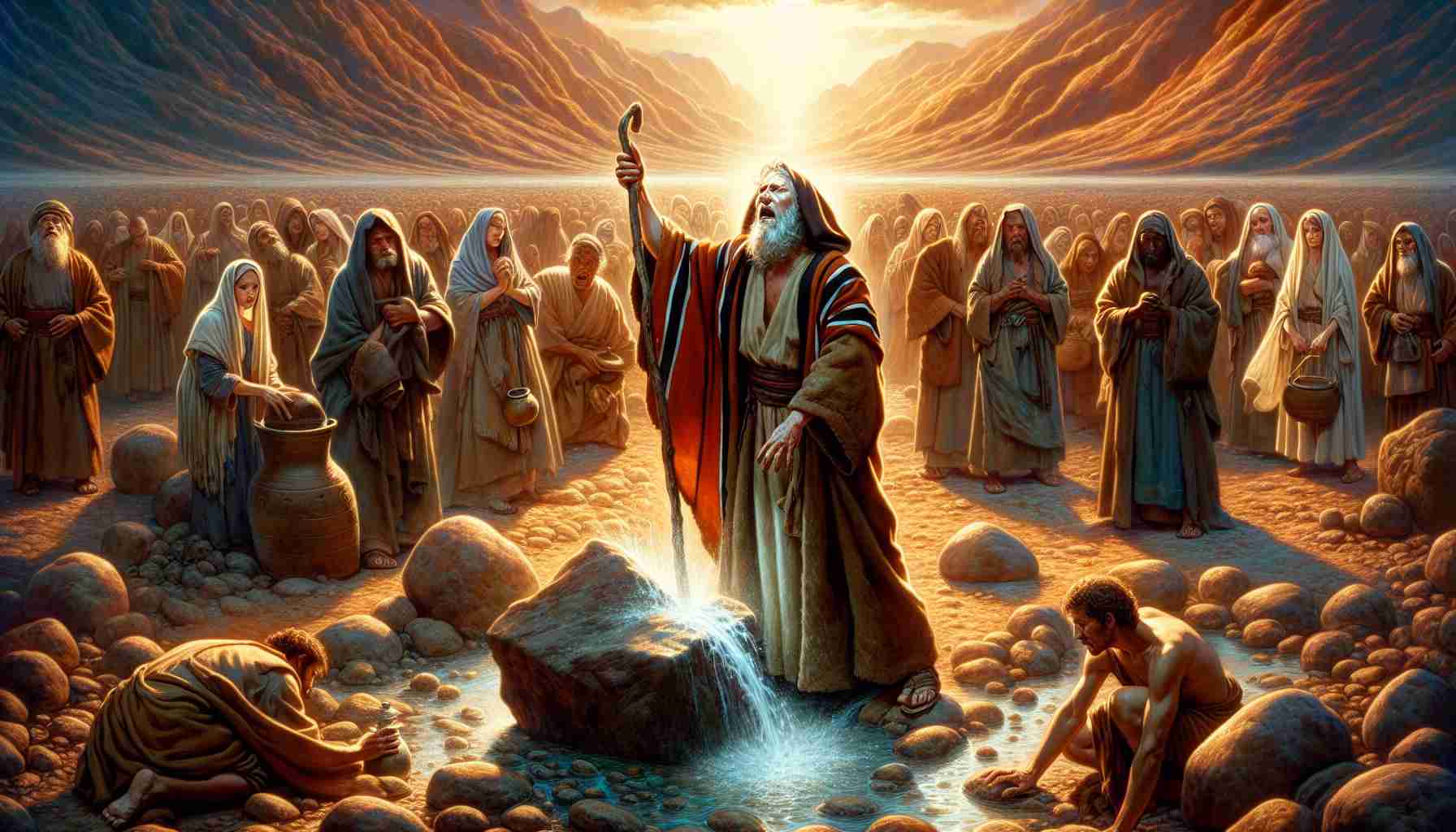

I had never been a loud man. Even before we left Egypt, I was the sort who folded blankets while others argued, fetched water while others shouted. My name isn’t known beyond my family, and that’s fine. But I was there, in the heat of Refidim, when our faith grew thinner than our water skins.
The sun was harsh that week. Each day seemed hotter than the last. My wife, Shira, had stopped singing. My son, Avi, cried through the night, thirsty and weak. I kept telling him to wait, to be patient. But in truth, I was scared too. There was no more water. The goats stopped bleating — even they were too dry to complain.
I didn’t raise my voice like the others. Not at first, anyway. I listened to them scream at Moses, asking why he’d led us out of Egypt — Egypt, where we were slaves, yes, but at least we had water. I hated the thought, but even I wondered. Had we really been brought out here just to die with cracked lips and empty hands?
Then the arguing grew louder. I heard someone threaten Moses with stones. And for the first time, I added my voice to the shouting. That’s what shame does when it’s mixed with fear — it turns into anger.
I watched as Moses walked away from us toward the Tent of Meeting. His shoulders slumped, his face as tired as ours. He spoke to God there. I was close enough to see his lips move but not enough to hear his words. Then he returned, staff in hand, with Aaron beside him.
His voice cut through the noise of our grumbling: “God has commanded me to strike the rock at Horeb.”
We followed. Little Avi clutched my hand so tightly it hurt. My throat burned. My feet dragged, heavy and slow.
When we reached the rock, a boulder larger than any man, I could barely believe Moses lifted his staff. He struck the stone—once—twice. I held my breath.
Then it came. A rush, like a river freed from chains. Water poured from the rock’s side, cold and clear as glass. We stared for a moment before someone screamed with joy. People ran, cupping the water in their hands, falling to their knees, letting it spill over their faces.
I scooped some to Avi’s lips. He drank like he’d never stop. Shira sat down and wept with relief.
And I? I looked at Moses. I had doubted him, doubted God’s mercy. Yet here, in the middle of a lifeless desert, water had poured from a stone because Moses believed.
I fell to the ground, not out of exhaustion, but shame — and then, hope. I had shouted in anger. Now, I whispered a prayer. Not for more water, but for stronger faith. The rock had not just given water. God had given us another chance — to believe.
I had never been a loud man. Even before we left Egypt, I was the sort who folded blankets while others argued, fetched water while others shouted. My name isn’t known beyond my family, and that’s fine. But I was there, in the heat of Refidim, when our faith grew thinner than our water skins.
The sun was harsh that week. Each day seemed hotter than the last. My wife, Shira, had stopped singing. My son, Avi, cried through the night, thirsty and weak. I kept telling him to wait, to be patient. But in truth, I was scared too. There was no more water. The goats stopped bleating — even they were too dry to complain.
I didn’t raise my voice like the others. Not at first, anyway. I listened to them scream at Moses, asking why he’d led us out of Egypt — Egypt, where we were slaves, yes, but at least we had water. I hated the thought, but even I wondered. Had we really been brought out here just to die with cracked lips and empty hands?
Then the arguing grew louder. I heard someone threaten Moses with stones. And for the first time, I added my voice to the shouting. That’s what shame does when it’s mixed with fear — it turns into anger.
I watched as Moses walked away from us toward the Tent of Meeting. His shoulders slumped, his face as tired as ours. He spoke to God there. I was close enough to see his lips move but not enough to hear his words. Then he returned, staff in hand, with Aaron beside him.
His voice cut through the noise of our grumbling: “God has commanded me to strike the rock at Horeb.”
We followed. Little Avi clutched my hand so tightly it hurt. My throat burned. My feet dragged, heavy and slow.
When we reached the rock, a boulder larger than any man, I could barely believe Moses lifted his staff. He struck the stone—once—twice. I held my breath.
Then it came. A rush, like a river freed from chains. Water poured from the rock’s side, cold and clear as glass. We stared for a moment before someone screamed with joy. People ran, cupping the water in their hands, falling to their knees, letting it spill over their faces.
I scooped some to Avi’s lips. He drank like he’d never stop. Shira sat down and wept with relief.
And I? I looked at Moses. I had doubted him, doubted God’s mercy. Yet here, in the middle of a lifeless desert, water had poured from a stone because Moses believed.
I fell to the ground, not out of exhaustion, but shame — and then, hope. I had shouted in anger. Now, I whispered a prayer. Not for more water, but for stronger faith. The rock had not just given water. God had given us another chance — to believe.